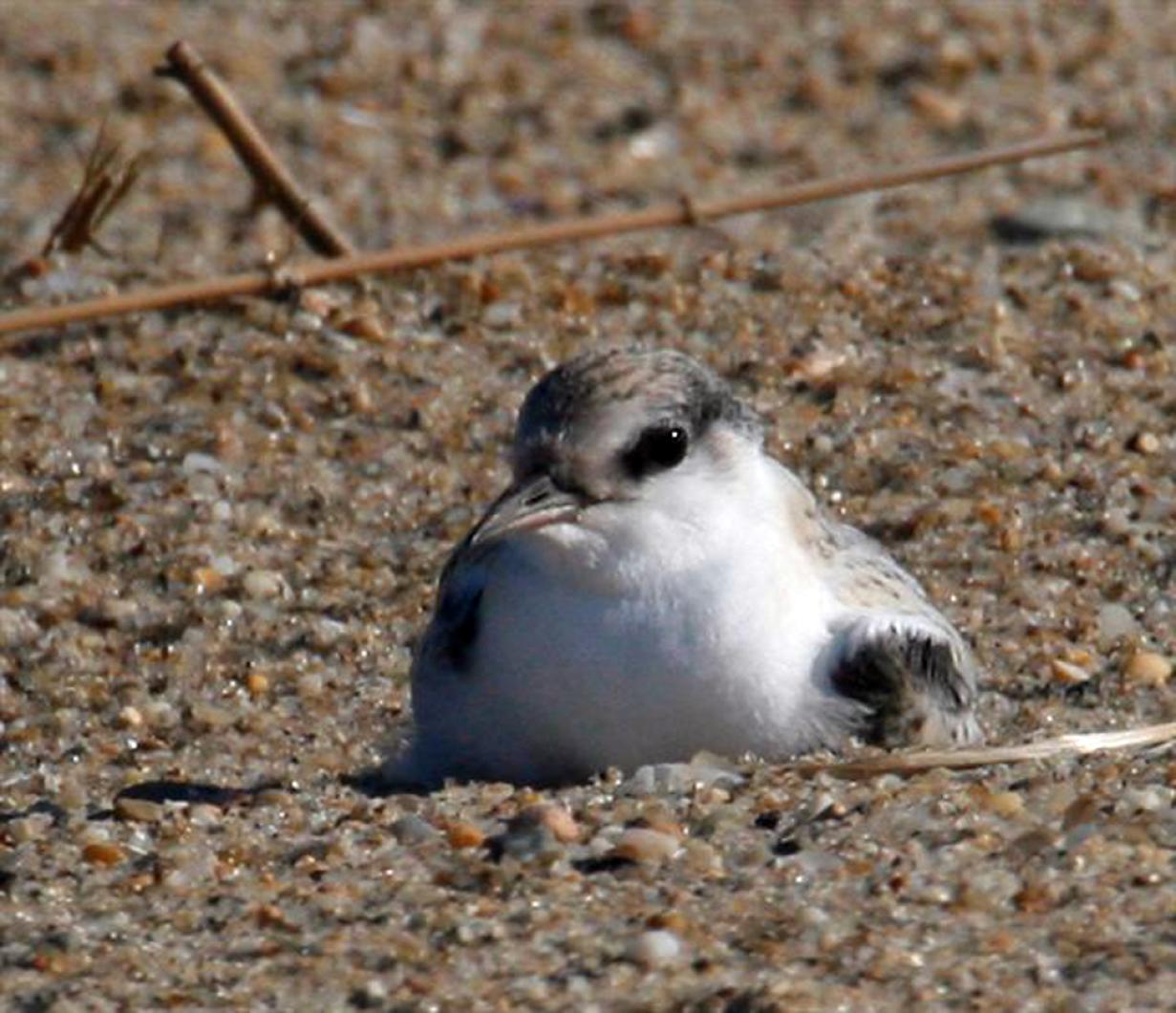The Chappaquiddick superintendent for The Trustees of Reservations has resigned and Trustees are taking full responsibility for an incident late last month where an unfledged nest of least tern chicks was nearly run over by a Trustees-owned four-wheel-drive truck that was on the barrier beach conducting a natural history tour.
The incident occurred on July 28 at Leland Beach on Chappaquiddick, which is owned by the state and managed by the Trustees. Chappaquiddick superintendent David Babson has since resigned and Leland Beach is now closed to over-sand vehicles from the Dike Bridge to Wasque Point, Chris Kennedy, southeast regional director for the Trustees, confirmed yesterday.
“The trails should have been closed to vehicles to protect nesting shorebirds and we failed to do that. This is a serious violation and we take full responsibility,” Mr. Kennedy said, speaking from his office in Vineyard Haven.
Mr. Kennedy said the incident occurred when a natural history tour truck carrying visitors out onto the barrier beach found itself parked directly over a nest of unfledged least terns. He said a visitor in the back of the open truck leaned over the side, saw one of the chicks beneath the truck and inquired what kind of bird it was.
The driver of the tour truck radioed back to the office for instructions immediately. “I happened to be on the radio and I heard what was going on,” Mr. Kennedy said. He said the beach was ordered closed and the truck was taken off the beach without harm to the unfledged chicks.
But that was not the end of it.
Mr. Babson, who has been on the job for 15 months, resigned his post on August 6 under pressure, and an uproar followed in the Chappaquiddick community, especially among fishermen and members of the local Trustees committee. “People on Chappaquiddick are angry, including the committee members, and I can understand that,” Mr. Kennedy said. “This has been very emotional for Chappy. Dave Babson is a great guy and everybody likes him and I like him too. And I wish him well,” Mr. Kennedy said. But he said given the seriousness of the incident, there was no choice but to ask for Mr. Babson’s resignation.
He said Sarah Trudel, head of the Trustees’ education program, has been appointed interim superintendent, and a search will begin immediately for a new superintendent.
Beyond personnel problems, the Trustees are facing possibly far more serious consequences as a result of the incident. Mr. Kennedy said he had been informed by Dr. Scott Melvin, a zoologist who heads the rare species shorebird section of the state Natural Heritage and Endangered Species Program, that the state would be conducting a full investigation. “Dr. Melvin has told me that the state considers this a serious violation and an incident that may warrant action,” Mr. Kennedy said.
Mr. Kennedy said his primary concern is that the incident not jeopardize the Trustees’ contract with the state to manage the beach.
“We could lose Leland Beach because of this,” he said. “And that would be a terrible outcome.”
Least terns are listed as a species of special concern under the Massachusetts Endangered Species Act. Mr. Kennedy said Leland Beach has also been the site of nesting piping plovers this summer; plovers are listed as a threatened species under both state and federal law. Destruction of a plover nest is punishable by possible fines and imprisonment.
Mr. Kennedy said Mr. Babson had allowed the interior trails at Leland Beach along the Poucha Pond side to remain open during the plover nesting season, but he said once the chicks had hatched the trails should have been closed. “We, the Trustees, failed to do that, endangering the chicks,” Mr. Kennedy said, adding:
“It’s a failure of the Trustees from the very bottom to the very top and we can’t shirk that. We made a grievous error.” He continued:
“I know there are people who disagree with the law, but we do not and we do not play around with this. You either follow the state guidelines for vehicles or you will not be allowed on the beach. And that in itself could have very serious repercussions for the Trustees.”
Under state guidelines, vehicles are prohibited within 200 yards of least tern nests with unfledged chicks. Least terns are colonial nesters; the exclusion zone applies to an area around the outermost nest, explained Carolyn Mostello, a coastal waterbird biologist for the Natural Heritage Program.
Ms. Mostello said she has no knowledge of the details of the incident and had no comment on it, but she did say: “The Trustees clearly take their responsibility very seriously and we know that they understand the guidelines well.”
Least tern chicks are considered semi-precocial; unlike piping plovers which are born precocious, least terns are born unable to feed themselves. The chicks are fed fish by their parents until they learn to fly; once the chicks fledge the parents teach them how to fish. “It’s a complicated process,” Ms. Mostello said, speaking from her office in Westborough.
Leland Beach was bought by the state in 1993 from the family of the late Oliver and Edmund Leland. The Trustees have managed the beach since then. The 108-acre barrier beach runs from the Dike Bridge to Wasque Point spanning Poucha Pond and the Atlantic Ocean. It links Wasque Reservation and Cape Pogue Wildlife Refuge, some 600 acres of windswept barrier beach owned by the Trustees at the extreme eastern edges of Chappaquiddick.






Comments (7)
Comments
Comment policy »